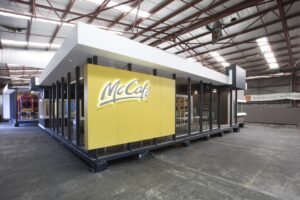
In the ever-evolving landscape of the hospitality industry, hotels are constantly seeking new ways to enhance the guest experience and boost revenue. One innovative approach gaining traction in recent years is the integration of modular retail stores within hotel properties. This trend represents a shift from the traditional hotel gift shops to a more versatile and dynamic retail concept. In this article, we will explore the reasons why hotels should consider modular retail stores, the benefits they offer, and how this strategy can contribute to the overall success of a hotel.
Meeting Guest Expectations
In today’s fast-paced world, travelers are increasingly seeking convenience and accessibility during their hotel stays. Modular retail stores within hotels cater to this demand by providing guests with an array of essential items and unique products, right at their doorstep. From snacks and toiletries to locally crafted souvenirs, these stores can offer a curated selection that meets guest expectations and enhances their overall experience.
Additional Revenue Streams
One of the most compelling reasons for hotels to consider modular retail stores is the potential for generating additional revenue. These stores can serve as a new source of income, especially during periods of low occupancy when traditional hotel services may be underutilized. The sale of merchandise, local products, and exclusive hotel-branded items can significantly boost a hotel’s bottom line.
Customization and Flexibility
Modular retail stores offer hotels a level of customization and flexibility that traditional gift shops may struggle to match. Hoteliers can easily adapt the store’s offerings to align with seasonal trends, local events, or specific guest demographics. The ability to quickly modify inventory ensures that the store remains relevant and appealing to guests at all times.
Enhancing the Local Experience
Hotels often aim to immerse guests in the local culture and provide them with authentic experiences. Modular retail stores can play a vital role in achieving this goal by showcasing regional products, artisanal goods, and items that reflect the unique character of the destination. This not only enhances the guest experience but also fosters a sense of connection between travelers and the local community.
Reducing Dependency on Third Parties
Many hotels rely on external vendors to supply their gift shops, which can result in higher costs and limited control over inventory. Modular retail stores empower hotels to manage their retail operations in-house, reducing dependence on third parties and allowing for better cost control and quality assurance.
Increased Guest Engagement
Modular retail stores can serve as more than just places to make purchases. They can become hubs for guest engagement and interaction. By hosting events, workshops, or tastings within the store, hotels can create memorable moments for guests and encourage them to spend more time on the property.
Leveraging Technology
The integration of technology into modular retail stores can enhance the guest experience further. For instance, hotels can implement self-checkout kiosks, mobile payment options, and digital signage to streamline operations and provide a seamless shopping experience for guests.
Sustainability and Eco-Friendly Initiatives
As sustainability becomes an increasingly important consideration for travelers, hotels can use modular retail stores to showcase their commitment to eco-friendly practices. By offering eco-conscious products and reducing single-use plastics, hotels can attract environmentally conscious guests and contribute to a greener future.
Competitive Advantage
In a fiercely competitive industry, hotels are constantly seeking ways to stand out from the crowd. The addition of modular retail stores can give hotels a unique selling point and help them differentiate themselves in the market. It can also be a key factor in attracting repeat customers who appreciate the convenience and offerings of the store.
Adapting to Changing Consumer Behavior
Consumer behavior is constantly evolving, and the COVID-19 pandemic accelerated many trends, such as the preference for contactless transactions and the desire for on-site convenience. Modular retail stores are well-suited to meet these changing consumer expectations, making them a smart choice for hotels looking to stay relevant in a post-pandemic world.
Conclusion
In conclusion, modular retail stores offer a multitude of benefits that hotels should seriously consider. They not only meet guest expectations for convenience and accessibility but also provide an additional revenue stream, customization options, and a means to enhance the local experience. Moreover, these stores reduce dependency on third-party vendors, increase guest engagement, and can be leveraged as a tool to showcase a hotel’s commitment to sustainability.
As the hospitality industry continues to evolve and adapt to changing consumer preferences, modular retail stores emerge as a strategic investment for hotels seeking to stay competitive and provide exceptional guest experiences. By integrating these stores into their properties, hotels can tap into a dynamic retail landscape that not only satisfies the needs of today’s travelers but also positions them for success in the years to come.